

AllThingsAssessment — Research, education tools and blog for assessment. Formative Assessment Tools & Resources. Recently, Teaching Channel brought you into classrooms where teachers and students are using formative assessment to adjust ongoing teaching and learning strategies to improve student learning: We partnered with Smarter Balanced Assessment Consortium to bring you videos of teachers using formative assessment as a deliberate four-step process.In Engaging Students with Productive Struggles, you'll see how math teachers are using lessons from Mathematics Assessment Project to encourage students to grapple with math concepts.In Letting Students Grapple, watch students engaging in formative assessment lessons that address misconceptions.
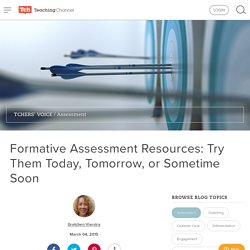
Formative Assessment (Part 3): Data Walls for Collaboration and Dialogue. This is part three in my series on formative assessment where I blog my journey through Dylan Wiliams’ book, Embedded Formative Assessment and share my school’s change journey.
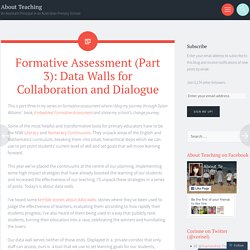
Some of the most helpful and transformative tools for primary educators have to be the NSW Literacy and Numeracy Continuums. They unpack areas of the English and Mathematics curriculum, breaking them into small, hierarchical steps which we can use to pin point students’ current level of skill and set goals that will move learning forward. This year we’ve placed the continuums at the centre of our planning, implementing some high impact strategies that have already boosted the learning of our students and increased the effectiveness of our teaching.
I’ll unpack these strategies in a series of posts. Today’s is about data walls. Make It Count: Providing Feedback as Formative Assessment. Providing students with feedback on written work can, at times, feel like a burden.
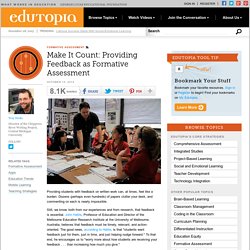
Dozens (perhaps even hundreds) of papers clutter your desk, and commenting on each is nearly impossible. Still, we know, both from our experiences and from research, that feedback is essential. John Hattie, Professor of Education and Director of the Melbourne Education Research Institute at the University of Melbourne, Australia, believes that feedback must be timely, relevant, and action-oriented. The good news, according to Hattie, is that "students want feedback just for them, just in time, and just helping nudge forward. " To that end, he encourages us to "worry more about how students are receiving your feedback . . . than increasing how much you give. " Edut. I thought I could read my students' body language.
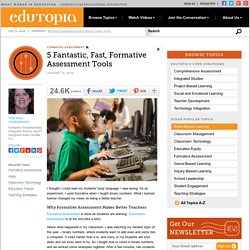
I was wrong. As an experiment, I used Socrative when I taught binary numbers. What I learned forever changed my views on being a better teacher. Love this idea! Use Formative Assessment as Your Classroom Fitbit #edchat #aussieED #edtech. Welcome! Over 35 Formative Assessment Tools To Enhance Formative Learning Opportunities, Part 5. Welcome to post number five in a series devoted to formative learning (assessment).
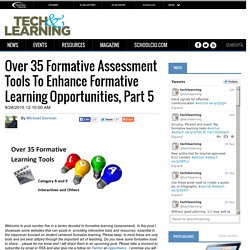
In this post I showcase some websites that can assist in providing interactive tools and resources essential in the classroom focused on student centered formative learning. Please keep in mind these are only tools and are best utilized through the important art of teaching. Do you have some formative tools to share… please let me know and I will share them in an upcoming post. Please take a moment to subscribe by email or RSS and also give me a follow on Twitter at mjgormans. Formative Assessment – Is it a Silver Bullet? There’s a wealth of research supporting the use of formative assessment; as synthesised by Hattie (2012).
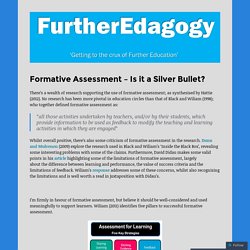
No research has been more pivotal in education circles than that of Black and Wiliam (1998); who together defined formative assessment as: “all those activities undertaken by teachers, and/or by their students, which provide information to be used as feedback to modify the teaching and learning activities in which they are engaged” Whilst overall positive, there’s also some criticism of formative assessment in the research. Dunn and Mulvenon (2009) explore the research used in Black and Wiliam’s ‘Inside the Black Box’, revealing some interesting problems with some of the claims.
Furthermore, David Didau makes some valid points in his article highlighting some of the limitations of formative assessment, largely about the difference between learning and performance, the value of success criteria and the limitations of feedback. Step 1. Step 2. Step 3. Education Week. (This is Part One in a two-part series on this topic)
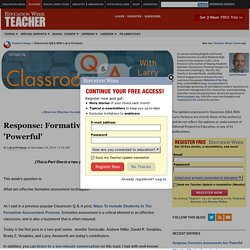
Everything is an assessment… What would happen if we didn’t have numbers?
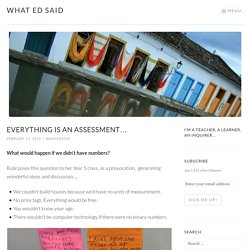
Rubi poses this question to her Year 5 class, as a provocation, generating wonderful ideas and discussion… We couldn’t build houses because we’d have no units of measurement.No price tags. Everything would be free.You wouldn’t know your age.There wouldn’t be computer technology if there were no binary numbers. One student declares ‘We wouldn’t have time’ to which another responds ‘There would still be time, just no way to record it’…and they are on their way to a deeper conceptual understanding. As Rubi shares the conversation with me, we are excited, not just by the kinds of things the children have thought about, but by the power of a simple open-ended question to provoke thinking and inspire discussion. She tells me she had planned to give a Maths pre-test during that lesson but, swept along by the comments, questions and conversation, had forgotten all about it.
How to (Quickly) Use Exit Slips. Formative Assessment Is the Cornerstone of Differentiated Instruction. By Andrew Miller Teachers often want to know where to start with differentiated instruction as it can seem overwhelming and daunting.
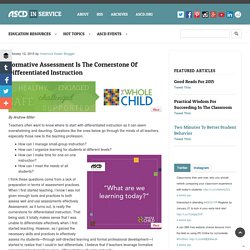
Questions like the ones below go through the minds of all teachers, especially those new to the teaching profession. Formative Assessment Tools & Resources. Assessment for, as and of Learning. Instant communication and twice yearly report cards… I am a ‘cloud granny’ , ever appreciative of the miracle of instant global connection which technology affords us… Usually when I write about the Granny Cloud, it’s in the context of Mitra’s School in the Cloud.
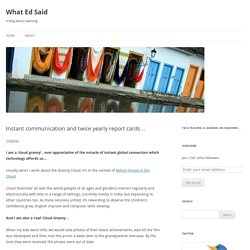
Cloud ‘Grannies’ all over the world (people of all ages and genders) interact regularly and electronically with kids in a range of settings, currently mostly in India, but expanding to other countries too. As these sessions unfold, it’s rewarding to observe the children’s confidence grow, English improve and computer skills develop. Mikaela Logan sur Twitter : "A4: Student feedback using scatter plots #aussieED... Ellis Elementary School - Baldrige Bites. Ellis Elementary is involved in a program called Baldrige in Education. The program is named after a man named Malcolm Baldrige. This program originally started in the business world where it had success and was then brought into the field of education. Pin by Lauren Jennings on Assessment. Social Media Exit Tickets - Twitter, Facebook, Texting and Instagram. Pin by ness. on Classroom: Common Core, Interviews & RTI. Self-Assessment Inspires Learning.
Self-reflection is self-assessment, and one of the most significant learning tools we can model for our students. Ultimately, we want our children and adolescents to be the self-assessors of their work, dispositions, and goals. Research repeatedly reports that the difference between good teachers and superior teachers is that superior teachers self-reflect. The brain is wired for this strategy, and it has been a part of our evolution.
When we teach to a child's or adolescent's brain, we empower that student with the "inner resources" that directly affect his or her ability to pay attention, engage, and create meaningful learning experiences. School culture is simply about relationships, and the brain is a relational organ designed to survive, think, and feel. Simply stated, when the brain feels any type of a threat (emotional, social, or cognitive stress) the thinking part shuts down. Online publication for school educators. Class projects, school surveys, formal tests, informal quizzes, observations, student work completed in lessons ... educators have a range of data sources at their fingertips. Assistant Principal Mario Bergamin explains the emphasis at his school in Tasmania is on interpreting all of this information and putting it to good use, avoiding the pitfall of a quick glance in a team meeting and filing it away. 'It's about making the children come alive and not just seeing them as a number represented in a graphic or tabular form,' he says.
Online publication for school educators. Professor Geoff Masters, CEO of the Australian Council for Educational Research, says A to E grading doesn't tell the whole story when it comes to student achievement. Teacher editor Jo Earp sat down with him to discuss possible alternatives, and what they would mean in practice for educators, students and parents. Jo Earp: You've written a couple of articles recently about the limitations of A to E grading. Can you talk our readers through what the alternative looks like? Awesome display on peer feedback. Rubrics to Help You Grade Students Assignments on Google Drive.
July, 2014 Chalkup is a great web tool that allows teachers to create classes and share different study materials on a message board that students can access in real-time. Chalkup lets you post discussion prompts, add comments to discussions, distribute announcements and assignments and view files. The handy feature I love about Chalkup is its Google Drive integration. This means that you can share files stored on your Drive right into your Chalkup class with one click or drag and drop them from your computer. What if you marked every book, every lesson? Reinventing the feedback wheel. Reinventing the wheel – a mistake? Of the many criticisms I’ve received as a teacher, one I’ve failed to outgrow is ‘reinventing the wheel.’ 7 Questions To Ask Yourself Before Giving An Assessment. NAPLAN Teaching Strategies 2013. Assessment for Learning: Home.
20 Simple Assessment Strategies You Can Use Every Day. Here's a "Box-It-In" exit slip that is a nested version ... Here's an exit slip for reflecting on "bright ideas." Teaching Ahead of the Curve: Formative Assessment Ideas for ... The Most Important Question Every Assessment Should Answer. MrH_low : #EntryTask & #ExitTicket:... 22 Easy Formative Assessment Techniques for Measuring Student Learning. Exit slips for ANY GRADE level - great to quickly assess ... 40 Alternative Assessments for Learning.
When people think of assessment, pencils and bubble sheets may be the first things that come to mind. Assessment does not always have to involve paper and pencil, but can instead be a project, an observation, or a task that shows a student has learned the material. In the end, all we really want to know is that the skill was mastered, right? Classroom Copilot15 Top Formative Assessment Strategies - Classroom Copilot. Formative Assessments Are Easier Than You Think! LaurenJennings : Group work @fizwiz... Exit Tickets: Making Learning Effective. Exit Tickets: Making Learning Effective.
Six Facets of Understanding with examples. Self-Assessment Tool. Formative Assessments Are Easier Than You Think! Education / "Table Texting" is a fun, interactive strategy you can use to get students to talk about whatever topic they need to discuss but are reluctant to. How do we assess understanding? School Stuff / Make and put on the door - Teach-A-Roo: Ticket Out the Door!...love this idea for exit tickets! 40 Alternative Assessments for Learning. 40 Alternative Assessments for Learning. Alternative Assessment. Best Start. Your Rubric.
Formative Assessment Strategies / Overview. Assessment for Learning: Home. Teachers Report Assistant. User Comment:"Thank you for the awesome report writing tool. What can I say but Ka mau te wehi! Kathy Schrock's Guide to Everything - Home Page.
Home Page. August 7, 2012.